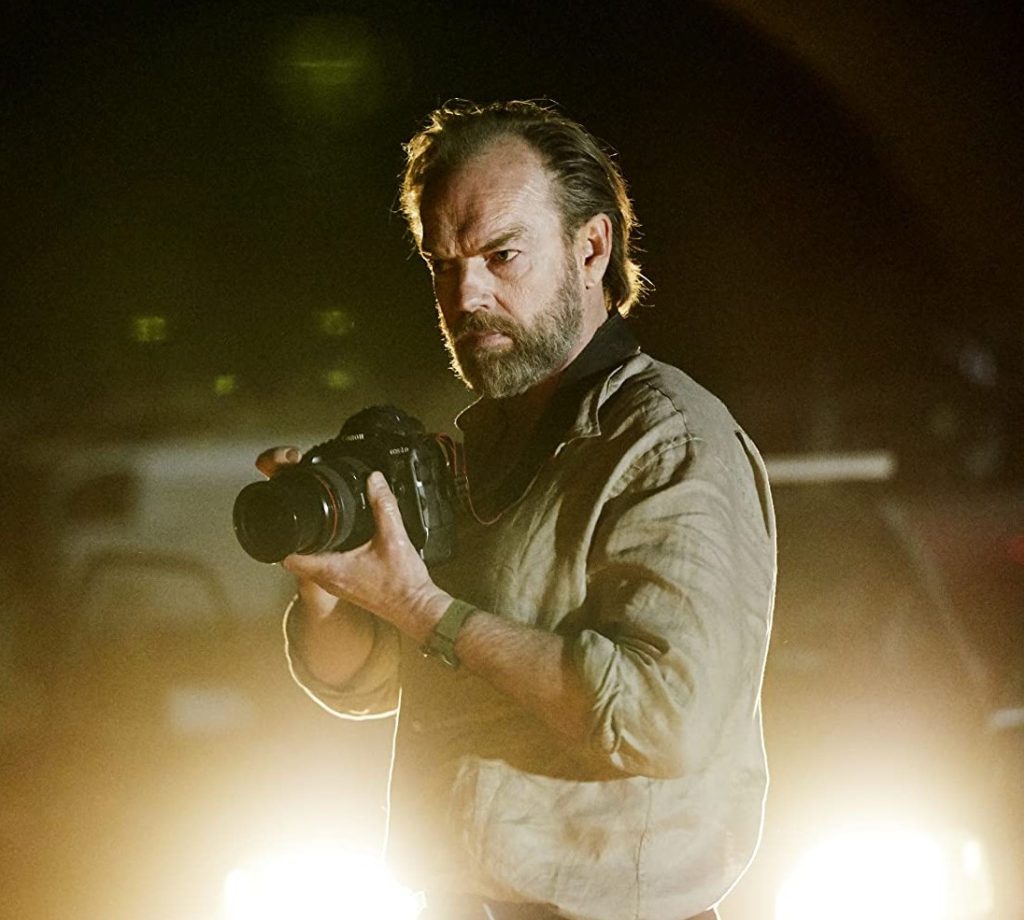Hearts and Bones
One image, two worlds
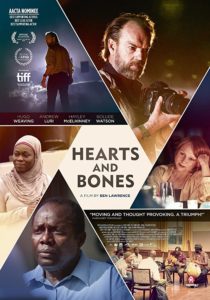 A lot of movies have already been made about the role of the press, especially in covering conflicts or catastrophes. It is always questioned whether what is important for the professional is to denounce the fact so that the world becomes aware, or personal fulfillment for making the best photo or report. A different aspect is presented in the excellent Australian film “Hearts and Bones” (AUS,2019).
A lot of movies have already been made about the role of the press, especially in covering conflicts or catastrophes. It is always questioned whether what is important for the professional is to denounce the fact so that the world becomes aware, or personal fulfillment for making the best photo or report. A different aspect is presented in the excellent Australian film “Hearts and Bones” (AUS,2019).
The protagonist is Dan Fisher (Hugo Weaving), an experienced photojournalist who has worked in all conflict scenarios of the past decades, with works highly praised not only for the quality of the photos but also for the boldness with which he ventures in the most dangerous environments.
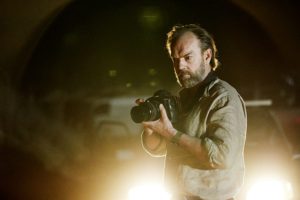 This boldness, at the same time that it earned him good results, also caused him numerous injuries, the consequences of which he still has today. Sometimes these injuries are also emotional, such as the death of a little girl struck by a land mine on his most recent mission.
This boldness, at the same time that it earned him good results, also caused him numerous injuries, the consequences of which he still has today. Sometimes these injuries are also emotional, such as the death of a little girl struck by a land mine on his most recent mission.
Upon returning home, Fisher is surprised by the news that his wife Josie (Hayley McElhinney) is pregnant. The news leaves Fisher very upset, in a confused feeling, as he and Josie had already been through the tragedy of losing a daughter. While digesting the news, Fisher is also pressured to make an exhibition with the best pictures of his career.
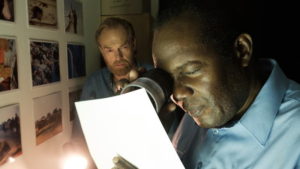 A new element enters into the troubled life of the photographer. Sebastian Ahmed (Andrew Luri), an immigrant from South Sudan, taken to Australia as a refugee, seeks out Fisher to ask him not to display the photos the photographer took during his village massacre, which happened fifteen years earlier.
A new element enters into the troubled life of the photographer. Sebastian Ahmed (Andrew Luri), an immigrant from South Sudan, taken to Australia as a refugee, seeks out Fisher to ask him not to display the photos the photographer took during his village massacre, which happened fifteen years earlier.
At first Fisher refuses to even consider the idea, but after suffering a heart problem it is Sebastian who takes him to the hospital, staying with him until he is better. Gradually we get to know the immigrant, who works as a taxi driver, is the conductor of a refugee choir, helps with social works, in addition to being a caring husband and father of a girl.
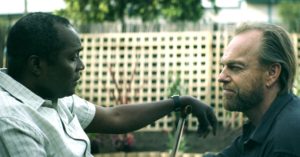 An unlikely friendship arises between the two men, at a delicate moment in the photographer’s life, which makes him rethink many things, including his unborn daughter and his own health.
An unlikely friendship arises between the two men, at a delicate moment in the photographer’s life, which makes him rethink many things, including his unborn daughter and his own health.
However, a casual discovery brings a shock to Fisher when he finds out the real reasons why Sebastian didn’t want his photos to be exposed. This revelation can imply many things, including the immigrant’s own stay in the country.
 The cast, Australian by birth or immigration, reflects the spirit of this film, which portrays a country formed largely by people who keep arriving from all over the world. The only name known internationally is Weaving himself, who once again shows versatility, ranging from the funny gay in “The Adventures of Priscilla, Queen of the Desert” (AUS,1994) to the king of elves in “The Lord of the Rings”, as well as the emblematic Agent Smith of “The Matrix” (USA,1999).
The cast, Australian by birth or immigration, reflects the spirit of this film, which portrays a country formed largely by people who keep arriving from all over the world. The only name known internationally is Weaving himself, who once again shows versatility, ranging from the funny gay in “The Adventures of Priscilla, Queen of the Desert” (AUS,1994) to the king of elves in “The Lord of the Rings”, as well as the emblematic Agent Smith of “The Matrix” (USA,1999).
This film raises some very interesting questions about the importance of the press’s role in world conflicts, regardless of whether it is out of sincere indignation or pure opportunism. But, the most relevant aspect shown is that, first of all, the journalist needs to understand what is going on before his eyes, under penalty of passing a wrong message to his audience.

